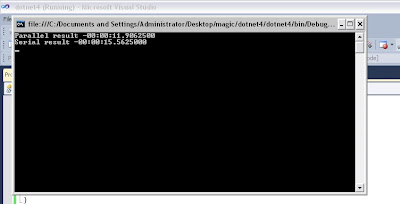Fun games, demos, community projects, and an extensible demo application
SDK with good documentation, add multi-"touch" to your own applications
Free and open-source project, games, and demos
http://touchless.codeplex.com/
Posted by Usama Wahab Khan at 2:39 PM 1 comments
Posted by Usama Wahab Khan at 12:41 AM 6 comments
Labels: Asp.net, Asp.net 4.0, C#, dotnet 4.0














Posted by Usama Wahab Khan at 1:53 AM 1 comments
Labels: Asp.net, C#, dotnet 4.0















Posted by Usama Wahab Khan at 10:20 PM 2 comments
Labels: C#, dotnet 4.0, linq

 When we use ObjectType as parameter in overload object initialized on compile time. dynamic parameter accept as anonymous datatype and initialized its self on runtime for overload method.
When we use ObjectType as parameter in overload object initialized on compile time. dynamic parameter accept as anonymous datatype and initialized its self on runtime for overload method.Posted by Usama Wahab Khan at 3:50 PM 2 comments
Labels: C#, dotnet 4.0
Parallelization is a major Enhancements in Microsoft dot.net 4.0 in .netframework 4.0 give`s advantage of multi core processors . Now you can divide load of your functions Parallelly on Multi Core Processors.
Advantage Of Parallel Programing
Many applications contain some segments of code that will benefit from parallelization; and some that
will not. Code that is likely to benefit from being run in parallel will probably have the following
characteristics:
• It can be broken down into self-encapsulated units.
• It has no dependencies or shared state.
A classic example of code that would benefit from being run in parallel is code that goes off to call an
external service or perform a long-running calculation (for example, iterating through some stock quotes
and performing a long-running calculation by iterating through historical data on each individual
quote).
This type of problem is an ideal candidate for parallelization because each individual calculation is
independent so can safely be run in parallel. Some people like to refer to such problems as
“embarrassingly parallel” (although Stephen Toub of Microsoft suggests “delightfully parallel”!) in that
they are very well-suited for the benefits of parallelization.
(Ref: Apress.Introducing.dot.NET.4.0.with.Visual.Studio.2010.Feb.2010)book
I Try to Show Deference between Serialized and Parallel functions


download Source code
By Usama Wahab Khan
Posted by Usama Wahab Khan at 6:13 AM 0 comments
Labels: C#, dotnet 4.0
Posted by Usama Wahab Khan at 1:04 AM 0 comments
Labels: C#, visual Studio 2010
I am Micorosoft MVP, MCT for Cloud , Data and AI | Chief Technology Officer @ evolution|AI Architect | Speaker | Blogger | Author | AI, Data, Cloud, Generative AI entusiast | Leader SPUAEUG/AIUAE Based in UAE About Me



